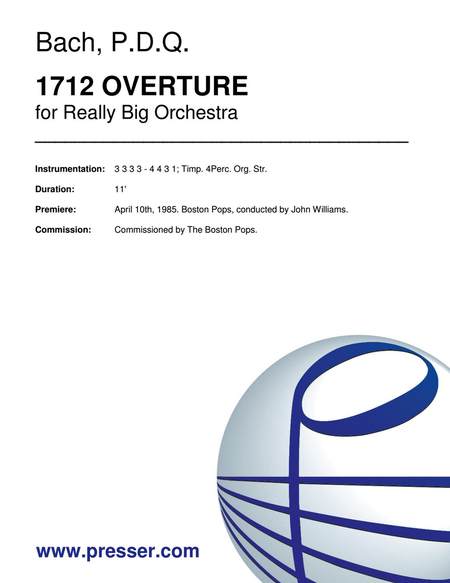1712 Overture
For Really Big Orchestra
-
Ships in 2 to 3 weeks
Details
Description
SKU: PR.41641576L
For Really Big Orchestra. Composed by PDQ Bach. Edited by Professor Peter Schickele. Large Score. With Standard notation. Duration 11 minutes. Theodore Presser Company #416-41576L. Published by Theodore Presser Company (PR.41641576L).UPC: 680160636549. 11 x 17 inches.
The 1712 Overture stands out in P.D.Q. Bach's oeuvre for two reasons, among others: it is by far the most programmatic instrumental piece among those by the minimeister of Wein-am-Rhein so far unearthed, and 2) its discovery has led to a revelation about the composer's father, Johann Sebastian Bach, that has exploded like a bombshell on the usually serene musicological landscape. The overture is based on an anecdote told to P.D.Q. Bach by a cousin, Peter Ulrich. Since P.U. Bach lived in Dudeldorf, only a few miles down the road from Wein-am-Rhein, he was P.D.Q.'s closest relative, and he was, in fact, one of the few members of the family who was on speaking terms with P.D.Q. The story, related to P.D.Q. (fortunately for us posterity types) in a letter, may be summarized thus: The town of Dudeldorf was founded by two brothers, Rudi and Dieter Dudel, early in the 18th century. Rudi remained mayor of the newborn burg for the rest of his long life, but Dieter had a dream of starting a musicians' colony, an entire city devoted to music, which dream, he finally decided, could be realized only in the New World. In 1712, he and several other bagpipers sailed to Boston, never to return to Germany. (Henceforth, Rudi became known as der deutscher Dudel and Dieter as the Yankee Dudel). Unfortunately, the head of the Boston Musicians' Guild had gotten wind of Dudel's plans, and Wilhelm Wiesel (pron. VEE-zle), known none too affectionately around town as Wiesel the Weasel, was not about to share what few gigs there were in colonial America with more foreigners and outside agitators. He and his cronies were on hand to meet Dudel's boat when it pulled into Boston Harbor; they intended to prevent the newcomers' disembarkation, but Dudel and his companions managed to escape to the other side of the bay in a dinghy, landing with just enough time to rent a carriage and horses before hearing the sound of The Weasel and his men, who had had to come around the long way. The Germans headed West, with the Bostonians in furious pursuit. soon the city had been left far behind, and by midnight so had the pursuers; Dieter Dudel decided that it was safe for him and his men to stop and sleep until daybreak. When they awoke, they found that they were in a beautiful landscape of low, forested mountains and pleasant fields, warmed by the brilliant morning sun and serenaded by an entrancing variety of birds. Here, Dudel thought, her is where I will build my colony. The immigrants continued down the road at a leisurely pace until they came upon a little church, all by itself in the countryside, from which there suddenly emanated the sounds of a pipe organ. At this point, the temptation to quote from P.U. Bach's letter to P.D.Q. cannot be resisted: They went inside and, after listening to the glorious music for a while, introduced themselves to the organist. And who do you think it was? Are you ready for this -- it was your old man! Hey, no kidding -- you know, I'm sure, that your father was the guy to get when it came to testing new organs, and whoever had that one in Massachusetts built offered old Sebastian a tidy sum to go over there and check it out. The unexpected meeting with J.S. Bach and his sponsors was interrupted by the sound of horse hooves, as the dreaded Wiesel and his men thundered on to the scene. They had been riding all night, however, and they were no spring chickens to start with, and as soon as they reached the church they all dropped, exhausted, to the ground. The elated Germans rang the church bells and offered to buy everyone a beer at the nearest tavern. There they were taught, and joined in singing, what might be called the national anthem of the New World. The melody of this pre-revolutionary patriotic song is still remembered (P.D.Q. Bach quotes it, in the bass instruments, near the end of the overture), but is words are now all but forgotten: Freedom, of thee we sing, Freedom e'er is our goal; Death to the English King, Long live Rock and Ross. The striking paucity of biographical references to Johann Sebastian Bah during the year 1712 can now be explained: he was abroad for a significant part of that year, testing organs in the British Colonies. That this revelation has not been accepted as fact by the musicological establishment is no surprise, since it means that a lot of books would have to be rewritten. The members of that establishment haven't even accepted the existence of P.D.Q. Bach, one of whose major works the 1712 Overture certainly is. It is also a work that shows Tchaikowsky up as the shameless plagiarizer that some of us have always known he was. The discovery of this awesome opus was made possible by a Boston Pops Centennial Research Commission; the first modern performance took place at the opening concert of the 100th anniversary season of that orchestra, under the exciting but authentic direction of John Williams.

 Share
Share